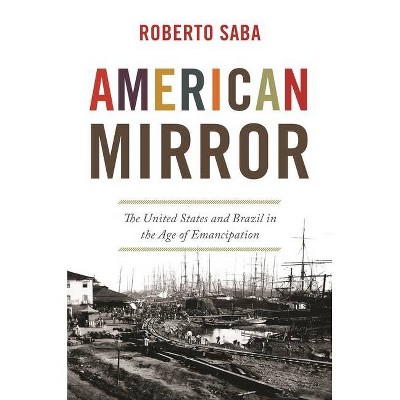American Mirror - (America in the World) by Roberto Saba (Hardcover)

Similar Products
Products of same category from the store
AllProduct info
<p/><br></br><p><b> About the Book </b></p></br></br>"In this book, Roberto Saba investigates how the antislavery struggle led Brazil and the United States to cooperate, and how this dynamic collaboration helped establish capitalism and free wage labor as the norm in the Western world. Drawing on overlooked writings from entrepreneurs, scientists, planters, Confederate refugees in Brazil, and journalists, Saba's extensive research reveals that while United States Southerners terrified Brazil with aggressive projects to perpetuate and expand slave labor, reform-minded Brazilians-including slaveholders looked to the American North as a powerful instrument of state- and nation-building. They welcomed advocates from the northern United States who helped them to spread labor-saving machinery, expand large-scale coffee production, advance technical education, diversify economic activities, develop urban centers, and expand transportation infrastructure. Saba shows that the binational collaboration of radical modernizers in the United States and Brazil transformed the political economy of both countries, consolidated wage labor as the dominant production system in the Western hemisphere, and laid the groundwork for the demise of Brazilian slavery and the expansion of American capitalism"--<p/><br></br><p><b> Book Synopsis </b></p></br></br><p><b>How slave emancipation transformed capitalism in the United States and Brazil</b> <p/>In the nineteenth century, the United States and Brazil were the largest slave societies in the Western world. The former enslaved approximately four million people, the latter nearly two million. Slavery was integral to the production of agricultural commodities for the global market, and governing elites feared the system's demise would ruin their countries. Yet, when slavery ended in the United States and Brazil, in 1865 and 1888 respectively, what resulted was immediate and continuous economic progress. In <i>American Mirror</i>, Roberto Saba investigates how American and Brazilian reformers worked together to ensure that slave emancipation would advance the interests of capital. <p/>Saba explores the methods through which antislavery reformers fostered capitalist development in a transnational context. From the 1850s to the 1880s, this coalition of Americans and Brazilians--which included diplomats, engineers, entrepreneurs, journalists, merchants, missionaries, planters, politicians, scientists, and students, among others--consolidated wage labor as the dominant production system in their countries. These reformers were not romantic humanitarians, but cosmopolitan modernizers who worked together to promote labor-saving machinery, new transportation technology, scientific management, and technical education. They successfully used such innovations to improve production and increase trade. <p/>Challenging commonly held ideas about slavery and its demise in the Western Hemisphere, <i>American Mirror</i> illustrates the crucial role of slave emancipation in the making of capitalism.</p><p/><br></br><p><b> About the Author </b></p></br></br><b>Roberto Saba</b> is assistant professor of American Studies at Wesleyan University.
Price History
Price Archive shows prices from various stores, lets you see history and find the cheapest. There is no actual sale on the website. For all support, inquiry and suggestion messagescommunication@pricearchive.us




















